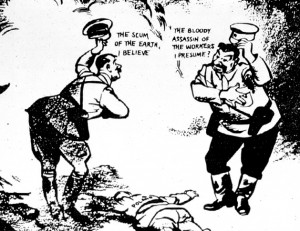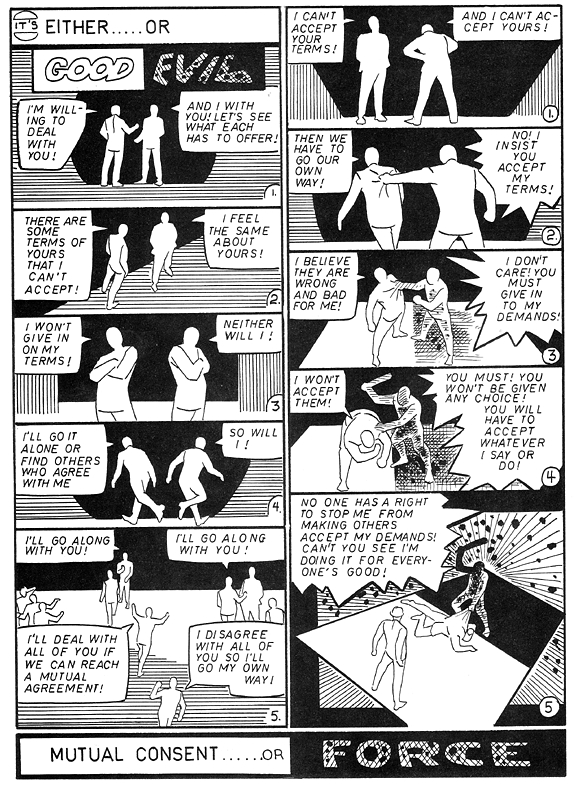"Though this nation has proudly thought of itself as an ethnic melting pot, in things racial, we have always been - and, I believe, continue to be - in too many ways . . . a nation of cowards. We . . . simply do not talk enough with each other about race." - Attorney General Eric Holder
"Oh, fine. Have it your way." - Adam Volle
I'm not the sort of man who worries himself a lot about racial issues.
I've never felt any need to wear a "White Power" t-shirt in order to make a point about "Black Power" ones. I think Affirmative Action is an obviously flawed concept, but it's not a pet issue. Illegal immigration bothers me little more. And hey, if a buncha folk of whatever bloodline care to celebrate "(X) History Month", I say, "Hey, sounds interesting," because y'know, really, it does.
Also, I'm aware that any discussion of "white people", "black people", etc. is fairly useless at best and racist at worst, since what you're really talking about when you discuss "white people", for instance, is a set of ethnicities (nevermind how many individuals) so diverse that only the most vague and general statements will be accurate. Take a hike through Europe (no, really; you won't regret it) and you'll be amazed at how much attitudes change as soon as you cross a border. You will find, for instance, that in Italy most traffic lines are considered mere suggestions, while in Switzerland you will be glared at for jaywalking. The same is of course true of "black people" or even just "African people", who in fact recognize the differences among themselves so well that we can't keep them from killing each other.
Finally, I'm an individualist. Ultimately I believe we are a planet filled with people, not races and nations. The idea of discussing races as though this world is populated by a half-dozen hive-minds with histories strikes me as largely nonsensical. A person does not bear part of any 'group responsibility' because he or she is born into a certain group.
So let's be clear: I'm not really interested in talking about various levels of responsibility attached to different skin colors. People like Eric Holder are. And it's only because they seem desperate to have a discussion of this sort that I'm now saying OK, fine - I'll do it. I will discuss how white people relate to black people, and red people, and yellow people, and everyone else. If only this one time, I will enter into our national dialogue on race relations and discuss both the role I think my own "white" race has played and will continue to play on God's green earth. I will do this thing, and I will do it for Eric Holder.
When you're finished reading, just remember to at least give me credit for this: I did wait until Black History Month was good and over first.
OK. That all said:
White people are at least thus far the coolest race to ever walk the face of this planet.
In all of recorded history, no other people has achieved so much in the sciences, nor on the battlefield, nor shown so much compassion off of it. No other demographic has contributed as objectively great a gift to the world as "our" (boy, how strange that feels to write) ideas of government and human rights. And no race, finally, has so well born the brunt of others' unmerited anger.
All of the above probably sounds like sick humor or absurd delusion to those familiar with the events of just the last half a millenium. Haven't white people committed many of the worst atrocities in history, they rightly ask? What about Slavery? What about Colonialism? What about all the genocide - from the wiping out of Native-American cultures to the Holocaust? What about Nagasaki and Hiroshima?
But such condemnatory questions - and the standard by which their answers are typically judged - depend on a very myopic world view. That is, you can only talk about how awful white people were to, say, own slaves, if you ignore the fact that Slavery is a worldwide institution that has existed in almost every known culture (including those of Africa and Israel) since time immemorial. A society of slaves has always been the standard rule by which other instititutions are judged, not the exception - and it would indeed be unfairly unobjective to judge any other way.
According to that standard, then, slaveholders prior to the 1800s were not especially evil. Instead, people who did not own slaves were especially good.
And who didn't support slavery prior to the 1800s? Very few people - some of whom were white abolitionists.
White people - indeed, all people - must be held to that same standard when we discuss the cringe-inducing subject of genocide. Though we may find it distasteful to think about, acts of cultural and ethnic genocide have long been common in world history. The ancient empires - those created by the Assyrians, Mongolians, Jews, Huns, Greeks, Babylonians, Japanese, Tamerlane, and numerous others - all often either completely eradicated entire cities full of their enemies or forced them to intermarry, opting for the complete destruction of others' identities than their physical forms. The city of Babylon, for instance, no longer exists for a reason, and Baghdad's population level did not recover from its visit by Tamerlane until the 1800s (!). In the context of this past, comparatively humanitarian countries such as the U.S.A. are the rogue states; the People's Republic of China, Nazi Germany, and North Korea look especially competent but not original.
Which brings us right 'round to judging the morality of the white races of Europe and eventually North America. Against this backdrop, this standard of racial and national relations, "our" conquering most of the known world was extremely impressive for the skill with which it was done, but not its depravity. Morally, all that is unique about the European race is what "we" did after placing "our" collective jackboot on the necks of other nations: We simply took it off. Other races were given not only their freedom, but equal representation in "our" governments.
This is an absolute miracle. In the history of the world, the white races are almost totally unique in having pulled up other races and given them equal standing within their own territories - in even encouraging other races to join them, to participate fully in the government. In fact, such openness is still comparatively rare in the countries of other races (how welcomed are immigrants to Asian lands? Arab ones?).
Let us also understand that other races were truly given the equal standing they now enjoy in white-dominated countries - for instance, the civil rights of African-Americans in the United States. The true triumph of Martin Luther King, Jr.'s many marches is not that he marched and freedom resulted; all of the marching in the world would have accomplished little if a majority of whites in the U.S.A. had not agreed that black people deserved all the rights they enjoyed. The glory of the Civil Rights movement instead is that the U.S.'s white establishment did not kill everyone involved. Yes, Martin Luther King, Jr.'s volunteers very bravely faced down dogs, a few arsonists, and police brutality, which are impressive obstacles - but let's admit that they were not exactly on par with the response of the Chinese government when its citizens tried to do the same:
[caption id="attachment_909" align="alignnone" width="755" caption="Tianenmen Square"] [/caption]
[/caption]
To review, then: in the white races we have a set of people who not only successfully conquered other races, but then proceeded to return their freedom to them - and in some cases repay them for the inconvenience. In the context of world history or even just modern times, they/we are saints - doubly so if you consider our forbearance when confronted with people like Reverend Lowery, who at President Obama's inauguration declared he pines for the day "when black will not be asked to give back, when brown can stick around, when yellow will be mellow, when the red man can get ahead, man, and when white will embrace what is right."
(A couple of points for you, Reverend: (1) by and large, we whites aren't asking for the blacks to give back anything; in fact as far as I can tell it's you guys and the reds who keep demanding reparations. We whites don't even need a 'thank you' for freeing you. We'd be content if you'd just shut up. (2) Also, a big 'Jump in a river' on behalf of 'yellows' everywhere. (3) The only society in the world that has so 'embraced what's right' as to allow a minority member to become its chief executive is... the U.S.A., dominated for the whole of its existence by white people.)
If I did indeed attach differing levels of group responsibility and value to various skin colors, I'd consider white people about the best possible group to which I might belong. While as guilty as anyone of history's ugliest acts, in the last couple hundred years white people have - almost as a race - evolved.
But that would only be if I thought of races as truly possessing their own identities. I don't.
If you do, though, then A.G. Eric Holder's comments notwithstanding, you may just want to shut up about it. It's not really a dialogue in which history is on your side.



















 [/caption]
[/caption]